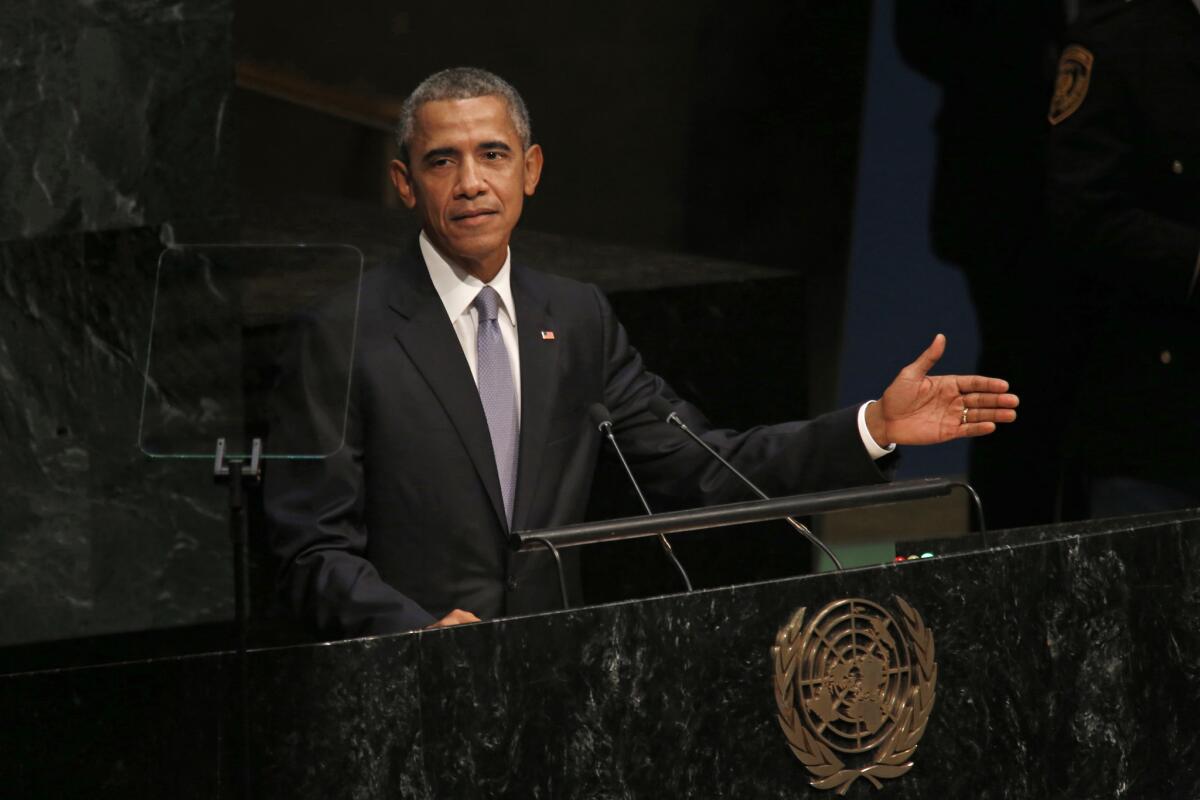Obama tries to define his legacy abroad -- while the rest of the world tests it

President Obama speaks during the 70th session of the United Nations General Assembly in New York on Monday.
- Share via
Reporting from the United Nations — With his time dwindling on the global stage, President Obama is seizing every moment of this week’s gathering of world leaders here to define his misunderstood worldview -- before it defines him.
As he tries to shape how the rest of the world regards his presidency, Obama is straining to play up his successes and to explain trouble spots that critics analyze as a sign of weak American leadership.
Increasingly, the rest of the world is testing where the president’s boundaries lie and what they might expect of the United States in the wake of his eight years of military disengagement and multi-nation approach to squelching war and violence abroad.
See the most-read stories this hour >>
“The world is turning around and saying, ‘You are being passive, you are not leading,’” Jon Alterman, a Middle East specialist at the Center for Strategic and International Studies, said in laying out what he sees as critics’ conclusions about Obama.
Chinese President Xi Jinping was willing to sit down with Obama at the White House in the days before the United Nations summit and talk about their joint fight against climate change and about committing more peacekeeping troops to the U.N. But Xi did not acknowledge that China was responsible for hacking into U.S. government databases nor did he promise to cease aggression against his neighbors.
Russia, too, has tested Obama, starting with its support last year for separatists in Ukraine and through expansion of its military presence in recent weeks in Syria, where it is allied with the government of President Bashar Assad, whose ouster Obama has repeatedly demanded.
For many critics, Obama’s shaky standing in spots around the globe emanates from his refusal to step up military intervention in the years-long civil war in Syria beyond the U.S.-led bombings against Islamic State militants there.
Obama has refrained from going after Assad militarily even after Assad bombed and used chemical weapons against his people. Obama sought diplomatic solutions but has insisted that it is not a war for the U.S. to fight.
The U.S. isn’t afraid to use its military, Obama tells other leaders, but it also won’t swoop in to solve problems that people of a country or region aren’t willing to try to solve themselves.
His reluctance hews to his promise to keep the U.S. out of wars, but it has raised serious questions about what it might take for the U.S. to get deeply involved in resolving conflict around the world and about who, in the absence of a U.S. military presence, might fill the vacuum.
NEWSLETTER: Get the day’s top headlines from Times Editor Davan Maharaj >>
Obama, with an eye toward his legacy on the world stage, pushed back Monday against the idea that the U.S. is not leading. He took issue with the argument “that the only strength that matters for the United States is bellicose words and shows of military force, that cooperation and diplomacy will not work.”
“I lead the strongest military that the world has ever known, and I will never hesitate to protect my country or our allies unilaterally and by force where necessary,” Obama said. “But I stand before you today believing in my core that we, the nations of the world, cannot return to the old ways of conflict and coercion.”
The deal to limit the Iranian nuclear program and the warming of relations with Cuba are signs that his diplomatic approach is working, Obama insists, proof that even historic adversaries can work together.
But the Cuba thaw, while historic, was hardly an urgent concern. The Iran deal may have been a feat of diplomacy, but history’s view of it will be determined by how closely both Iran and Obama’s successor follow it, taking the question of its success out of the president’s hands.
The drawdown of troops in Iraq was an easy idea for Obama to sell to the American people, weary of war when he took office. It was a fair reading by Obama of his mandate, said Alterman of the Center for Strategic and International Studies.
On Syria, “he isn’t entering into an open-ended commitment,” said Alterman. “He is being careful about the commitment of U.S. energy.”
That has consequences for the rest of the world, where some see the U.S. as retreating and leaving room for other big state players to assert themselves.
“This is a new, weaker America that is having the Russians run circles around it,” Alterman said.
The evidence that world leaders are taking note of Obama’s passivity is mounting.
Putin got a meeting with Obama on the sidelines of the U.N. on Monday even though he has steadfastly refused to comply with the terms of his own agreement to withdraw troops from Ukraine.
The rise of Islamic State, also known as ISIS, came in the wake of a precipitous withdrawal of American troops during the Obama administration.
“All of this adds up to a policy of disengagement,” said Kim Holmes, a distinguished fellow at the conservative Heritage Foundation and a former State Department official in the George W. Bush administration. “He’s pulling back and retrenching, and leaving vacuums in our wake. Unfortunately, in those vacuums, China and Russia and ISIS have risen.”
For more White House coverage, follow @cparsons
ALSO
Russian analysts cast Putin as rescuing Syria from Western bungling
Younger immigrants in U.S. illegally try to live without parents’ fears
Planned Parenthood goes head-to-head with Republicans seeking its demise
More to Read
Sign up for Essential California
The most important California stories and recommendations in your inbox every morning.
You may occasionally receive promotional content from the Los Angeles Times.











